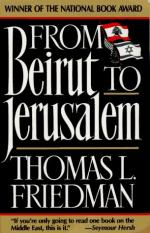
|
| Name: _________________________ | Period: ___________________ |
This test consists of 5 multiple choice questions, 5 short answer questions, and 10 short essay questions.
Multiple Choice Questions
1. Over time, who does Friedman learn to want to talk to for his information?
(a) The police.
(b) The other journalists' fixers.
(c) The people who work in the hotel.
(d) The people who will not accept him in their clubs.
2. Where does Friedman learn to be a journalist?
(a) In Beirut.
(b) In London.
(c) In journalism school.
(d) In Jerusalem.
3. What does Friedman say becomes a more threatening problem than Arafat?
(a) Maronites.
(b) Syrian military force.
(c) Lebanese activism.
(d) Islamic fundamentalism.
4. On what date does a suicide bomber drive a truck into the U.S. embassy in Beirut?
(a) May 1, 1983.
(b) April 1, 1983.
(c) April 25, 1983.
(d) April 18, 1983.
5. According to Friedman, how do the people who remain in Beirut cope with the stress?
(a) They stay inside and board up their homes so they don't see what is happening.
(b) They keep themselves busy with their jobs.
(c) They make up their own mind games or find ways to separate themselves from the victims.
(d) They meet in small groups and discuss ways to cope.
Short Answer Questions
1. What is the secret to Arafat's success?
2. How many people do the Red Cross estimate were killed during the Sabra and Shatila massacre?
3. Where does Friedman go when the fighting begins as curfew goes into effect?
4. Where does the Beirut press congregate?
5. When do the Marines finish their withdrawal from Beirut?
Short Essay Questions
1. Did the fact that Friedman was Jewish affect his reporting or his relationships while in Beirut?
2. Why did the Marines return to Beirut and how were they received then?
3. Why did the press congregate at the Commodore Hotel?
4. What two events happen immediately upon Friedman's return to Beirut in April, 1982?
5. Why did Friedman refer to Yasir Arafat as the "teflon guerrilla"?
6. What policy did the PNC adopt during its meeting in Algiers in February, 1983?
7. What are three things that Friedman cites as differences between the Arabs and the Jews?
8. Why does Friedman feel that in the early 1980s the PLO is presenting itself as a victim?
9. Why is there support for the Israeli invasion from both political parties?
10. Where did Friedman learn to be a journalist and what was one of the obstacles he faced in checking out his facts?
|
This section contains 848 words (approx. 3 pages at 300 words per page) |

|




